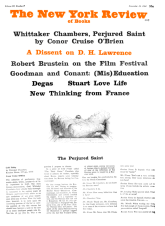In response to:
The Modern Theater from the October 22, 1964 issue
To the Editors:
As one who disagrees with much in Robert Brustein’s The Theatre of Revolt, I write to protest Nigel Dennis’s review of the book (NYR, Oct. 22). Comment on all Mr. Dennis’s inadequacies is not feasible here; I concentrate on a few points.
It is trifling with a clearly defined term to say that “revolt” does not begin about a hundred years ago but with Euripides. The plays of Euripides, for all their contemporary daring, share the religious cosmos and social canons of their audience. Does Mr. Dennis maintain that this is also true of Ibsen and Genet?
Then he wonders whether the term “revolt” applies even in the last century. “One can, if one insists, see The Cherry Orchard as a work of revolt against decadence…” If one insists. Well, if one does not insist, what is The Cherry Orchard? Mr. Dennis’s answer: “…but it seems a pity to do so when the author was at such pains to mix his elements and present all his characters with an ineffable gentleness.” These mixed elements and gentleness presumably indicate to Mr. Dennis that Chekhov was pleased with the society in which he lived.
“And what of Hedda Gabler? The play is about a woman in revolt. But is the author in revolt?” Mr. Dennis’s play August for the People is about a man maddened by the vulgarities of mass society. Are we to assume that because the author is sane he merely invented a character and a fiction?
Mr. Brustein has attempted a philosophical-psychological-artistic analysis, one of the few original works of dramatic criticism in the post-war era and a highly pertinent one. It is a dis-service to treat it simply as an extension of radio-concert announcer’s gush. (“When Beethoven wrote this symphony he was in love with the Countess Guicciardi.”) The worst aspect of Mr. Dennis’s review is that, on the basis of his own works, one suspects him of false naiveté.
Stanley Kauffmann
New York City
This Issue
November 19, 1964



